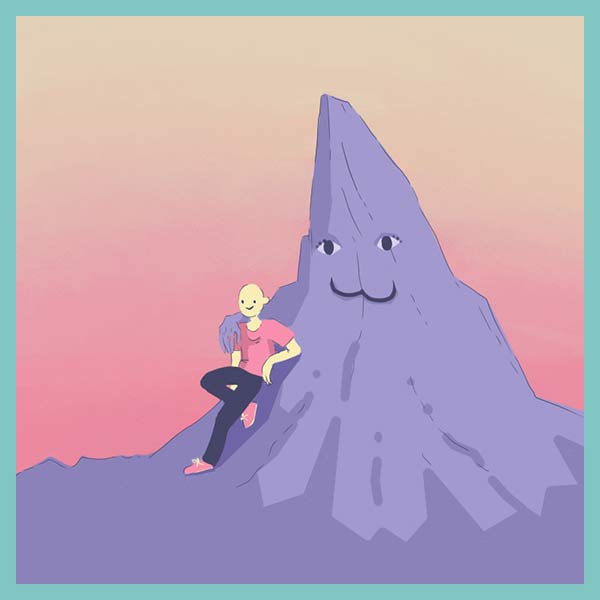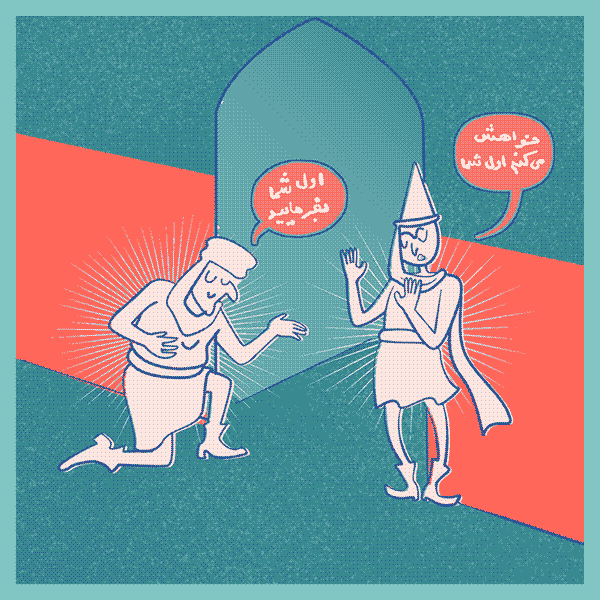Mountains in Persian Proverbs

کوه
(B2 مُناسب برایِ فارسی آموزانِ سَطح )
یکی از زیباییهای زبانِ فارسی استفاده از واژههای مَربوط به طبیعت در مَثَلها و اِستِعارهها است. گویشوَرانِ زبانِ فارسی به کوه، دَشت، جنگل، دِرَخت و دریا عَلاقهی زیادی دارند. شاید یکی از دلایلش این باشد که ایران، طبیعتی گوناگون دارد. این گوناگونی بر زبانِ فارسی هم تأثیر گذاشته و ضَربالمَثَلهای زیادی را به وجود آورده است. یکی از مهمترین نَمادهای طبیعی در زبان فارسی، کوهستان است. واژه یِ کوه در مَثَلهای فارسی به شکلهای مُختَلف استفاده شده است، چون کوه در فرهنگ ایرانی نمادِ ثُبات، قُدرَت، عَظِمَت و مقاومت است. نام کوه البرز و قُله ی دَماوَند از زمانِ فردوسی تا الان در اَدَبیاتِ فارسی بارها تِکرار شده است.
در این مَطلَب چند ضَربُالمثَل که در آن کلمهی کوه به کار رفته است را یاد میگیریم.
Mountains
(Farsi Level: B2)
One of the beauties of the Persian language lies in employing words related to nature in its proverbs and metaphors. Persian speakers have a fondness for mountains, plains, forests, trees, and seas. One explanation for this could be Iran’s diverse natural landscapes. This diversity has also influenced the Persian language and given rise to numerous proverbs. One of these natural symbols used in the Persian language is “mountain.” In Iranian culture, mountains are symbols of stability, power, grandeur, and resistance. The name of Alborz Kuh and Mount Damavand has been repeatedly used in Persian literature since the time of Ferdowsi.
In this article, we learn several sayings in which the word ‘mountain’ is used.
کوه به کوه نمیرسه، ولی آدم به آدم میرسه
[kuh be(h) kuh nemirese(h), vali âdam be(h) âdam mirese(h)]
“Mountains do not meet but people do”
ضَربُالمثَل «کوه به کوه نِمیرسه ولی آدم به آدم میرسه» وقتی بهکار میرود که میخواهیم به کِنایه بگوییم اگر شَخصی رَفتاری ناعادلانه در حَقِ انسانِ دیگری داشته باشد، بالاخره به مُجازاتِ عَملِ خود میرسد. یعنی اگرچه دنیا خیلی بُزرگ است اما آنقدر هَم کوچک است که در آن دو نفر که در گذشته به هَم بَدی کردهاند باز هم باهم روبِرو میشوند. در واقِع این ضَربُالمثَل میگوید که همه ممکن است یک روز به هم اِحتیاج پیدا کنند، پس بهتر است امروز رَفتار خوبی با هم داشته باشند. در گفتگوی زیر میتوانید ببینید که «مینو» از این مَثَل چگونه استفاده میکند.
The saying “Mountains do not meet, but people do” is often used ironically to suggest that if someone treats another person unfairly, they will eventually face the consequences of their actions. It emphasizes the interconnectedness of our lives and serves as a reminder that the world is smaller than we think. People may cross paths again sometimes, so it’s important to treat others with kindness and respect. We never know when we may need their help or support. The following conversation is a good example to help Farsi learners how to use this proverb.
گُفتگوی یک
مینو: سامان، من یه کمکی لازم داشتم.
سامان: چی شده مینو؟
مینو: دارم یه ماشین میخرم، یکم پول کم آوردم. میتونی بهم قرض بدی، من کم کم بهت پس میدم.
سامان: شرمنده، من الان امکانش رو ندارم، می خوام برا خودم بازی بخرم.
مینو : خیلی نمیخوام، فقط بیست تومن.
سامان: تو بگو یه تومن، نمیتونم.
مینو: باشه، یادت بمونه، « کوه به کوه نمیرسه اما آدم به آدم میرسه.»
goftogu-ye yek
Minu: Sâmân man ye(h) komaki lâzem dâštam.
Sâmân: či šode(h) Minu
Minu: dâram ye(h) mâšin mixaram, yekam pul kam âvordam. mituni behem qarz bedi?
Sâmân: šarmande(h) man alân emkâneš ro nadâram. mixâm barâ xodam bâzi bexaram.
Minu: xeyli nemixâm, faqat bist toman.
Sâmân: to begu ye(h) toman, nemitunam.
Minu: bâše(h), yâdet bemune(h). “kuh be kuh nemirese(h), ammâ âdam be âdam mirese(h).”
Dialogue One
Minu: Sâmân, I need your help.
Sâmân: What’s up, Mina?
Minu: I’m trying to buy a car, but I don’t have much money. Could you lend me some? I’ll pay you back gradually.
Sâmân: I’m sorry, I can’t afford it right now. I’m saving up to buy a video game for myself.
Minu: I don’t need a lot, just twenty Toman.
Sâmân: I’m sorry, I can’t lend you even one Toman.
Minu: Okay, just remember, “mountains do not meet but people do.”
از پُشتِ کوه آمدن
[az pošt-e kuh âmadan]
“Someone Came from behind the Mountain”
در گُذَشتههای خیلی دور، زمانی که ماشین و هَواپیما هنوز ساخته نشده بودند، سفر کردن به آسانیِ الان نبود، مخصوصاً اگر دو منطَقه با کوه یا دریا از هم جدا شده بودند. برای همین، فرهنگِ دو شهری که در دو طَرفِ کوه قَرار داشتند، ممکن بود خیلی با هم فَرق داشته باشد. وقتی یک نفر با سختیِ زیاد از پشتِ کوه به شَهر میآمد، خیلی طول میکِشید تا با فرهنگِ جدید آشنا شود و در این شهر پَذیرفته شود.
به همین دلیل، الان در زبان فارسی به کسی که به دُرُستی اَدب را رَعایت نمیکند، یا حَرفی میزَند که نشان دَهندهی بیخبری او از آداب و رِسوم و سادهلوح بودنش است، میگویند «فُلانی از پشتِ کوه آمده». اما اگر میخواهید از این جمله استفاده کنید، حَواستان باشد که این عِبارَت، معنی توهینآمیز و حالتِ تَحقیر دارد. چون نِشان میدهد که این شَخص چیزی از اَدَب و رسومِ مَنطَقه نمیداند.
In the past, before the invention of cars and airplanes, traveling was quite challenging. If two regions were separated by mountains or seas, it could be even more difficult. Due to this, the cultures of cities separated by mountains could differ considerably, so it took a long time for new arrivals from the back of the mountains, to become acquainted with the new culture and integrate into the new society.
In Persian, someone who does not respect etiquette properly or says something that shows their ignorance of customs and traditions is called “someone who came from behind the mountain.” The equivalent of this term in English can be “Just got off the boat”. It’s important to note that this phrase has an insulting meaning and is used to show contempt. It implies that the person knows nothing about the culture and customs of the region. Therefore, this expression must be used cautiously to avoid offending anyone.
گُفتگوی دو
کیان: این علی چرا اینجوریه؟ دیروز تو مهمونی آبروم رو بُرد.
فَریبا: چرا؟ مگه چی کار کرده؟
کیان: بَلَد نبود چطوری لازانیا بخوره، با دخترا نمیتونست دُرُست حرف بزنه، آخر شب هم بدون خداحافظی و تشکر از مهمونی رفت.
فریبا: ناراحت نشو، علی پسرِ خوبیه، فقط یهکم ساده است.
کیان: واقعاً انگار از پُشتِ کوه اومده.
goftogu-ye do
Kiân: in ‘Ali čerâ injori-ye(h)? diruz tu mehmuni âberum ro bord.
Faribâ: čerâ? mage čikâr karde(h)?
Kiân: balad nabud četori lâzâniya bexore(h), bâ doxtarâ nemitunest dorost harf bezane(h), âxar-e šab ham bedun-e xodâhâfezi-o tašakkor az mehmuni raft.
Fariba: nârâhat našo, ‘Ali pesar-e xubiye(h), faqat yekam sâde(h)-ast.
Kiân: vâqe’an engâr az pošt-e kuh umade(h).
Dialogue Two
Kiân: Why is Ali acting like this? He embarrassed me at the party yesterday.
Faribâ: Oh seriously? What did he do?
Kiân: Well, he struggled to eat the lasagna, behaved awkwardly around the girls, and left the party without even saying goodbye or thanking the host.
Faribâ: Don’t be too hard on him. Ali’s a nice guy, just a bit immature.
Kiân: as if “he’s just got off the boat!”
مثلِ کوه پُشتِ کسی بودن
[mesl-e kuh pošt-e kasi budan]
“To have Someone’s Back Like a Mountain”
دو ضَربُالمَثَلِ قبلی مَعنیِ منفی دارند و ممکن است شما را نِگران کند که شاید آنها را در جای درستی استفاده نکنید. اما «مِثل کوه پُشتِ کسی بودن» را با خیالِ راحت میتوانید به کار بِبَرید. وقتی میگوییم «کسی مثلِ کوه پُشت ما ایستاده» مَنظورمان این است که یک نفر با همهی توانایی و قَدرتش از ما حِمایت و پُشتیبانی میکند تا ما هرگز اِحساسِ تنهایی و بیپناهی نکنیم. اگر شما هم در زندگی کسی را دارید که همیشه به شما کمک می کند و پُشتیبان شماست، میتوانید بگویید که او «مثلِ کوه پُشتِ شما ایستاده.»
Two previous proverbs have a slightly negative connotation that might cause you to worry about using them in the right place. But you can use this one without any concern. When we say “to have someone’s back like a mountain” we mean that someone supports and stands by a person with all their strength so that we do not feel alone or helpless. You can also say that someone “stands behind you like a mountain” if you have someone who always helps you.
گُفتگوی سه
نادر: ندا، ندا، نداااا!
ندا: ها، بله؟ چی شده؟
نادر: حواست کجاست؟ چرا جواب نمیدی؟
ندا: فکرم مشغوله، دارم به یه بیزینس جدید فکر میکنم، اما میترسم نتونم از پسش بربیام.
نادر: چرا؟ تو که همیشه خیلی خوب کارها رو مدیریت میکنی.
ندا: آره، اما قبلا بابام پشتم بود، الان تنهام، میترسم نتونم.
نادر: نَترس، برو جلو، من مِثلِ کوه پشتت وایستادهام. هر کمکی از دستم بربیاد برات انجام میدَم.
ندا: خیلی مهربونی نادر.
goftogu-ye se(h)
Nâder: Nedâ, Nedâ, Nedâââ!
Nedâ: hâ, bale(h), či šode(h)?
Nâder: havâset kojâst? Čerâ javâb nemidi?
Nedâ: fekram mašqule(h). dâram be ye(h) bizines-e jaded fekr mikonam, ammâ mitarsam natunam az paseš bar biyâm.
Nâder: čerâ? to ke hamiše(h) xeyli xub karhâ ro modiriyat mikoni.
Nedâ: âre(h), ammâ qablan bâbâ poštam bud, alân tanhâm, mitarsam natunam.
Nâder: natars, boro jolo, man mesl-e kuh poštet vaystâde(h)-am. har komaki az dastam bar biyâd barât anjâm midam.
Nedâ: xeyli mehrabuni Nâder.
Dialogue Three
Nâder: Nedâ, Nedâ, Nedâ!
Nedâ: Yeah? What’s wrong?
Nâder: Where are you? Why don’t you answer?
Nedâ: Sorry, I was lost in my thoughts. I was thinking about a new business, but I’m afraid I won’t be able to handle it.
Nâder: Why? You’ve always managed things very well.
Nedâ: Yeah, but before, my dad was standing behind me. Now I’m alone. I’m afraid I won’t be able to.
Nâder: “Don’t be afraid! Keep going. “I have your back like a mountain”. I’ll do whatever I can to help you.
Nedâ: You are very kind, Nâder.








Leave A Comment